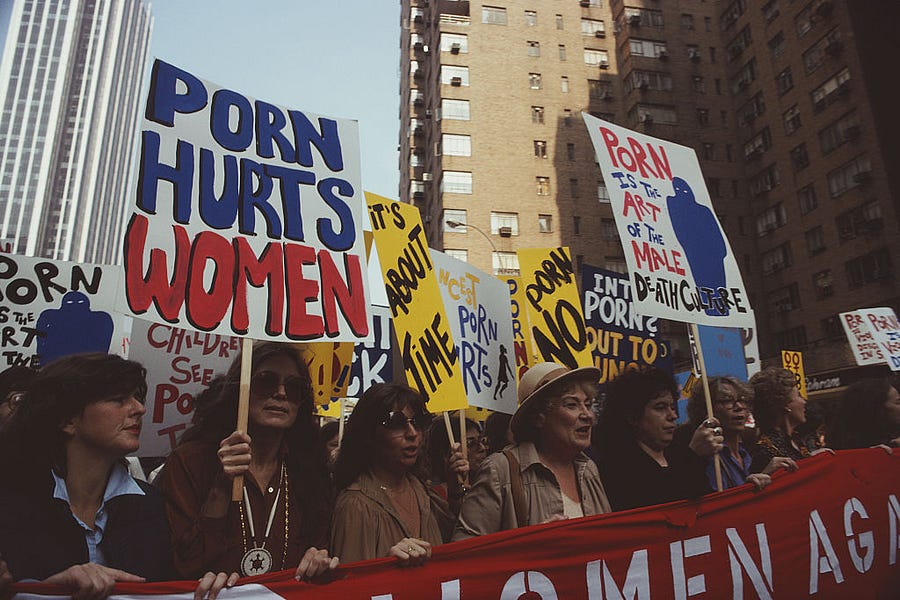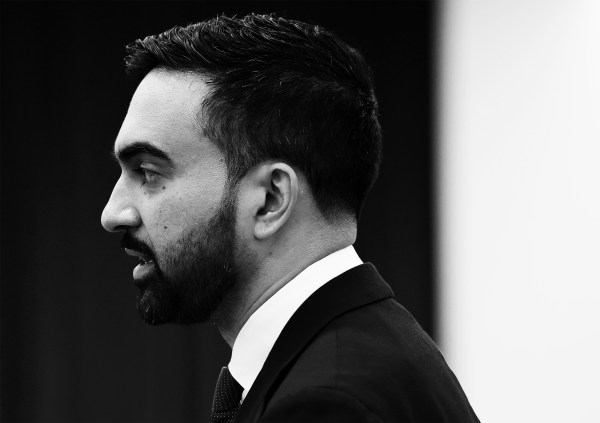Last month I read a story that gave me a surge of cultural hope. No, strike that. It gave me another surge of cultural hope. And it made me ask a key question that afflicts more homes and more hearts than virtually any political issue that dominates the news. Is America ready for a culture change on pornography?
And that leads to a second question. Is America ready for a new alliance between feminists and Evangelicals, between left and right, to achieve that change?
The story that gave me hope came last month from New York Times columnist Michelle Goldberg. It begins with two powerful paragraphs. Forgive me for quoting them in full:
In her new book, “The Right to Sex: Feminism in the Twenty-First Century,” the philosopher Amia Srinivasan, who is quickly becoming one of the most high-profile feminist thinkers in the English-speaking world, describes teaching Oxford students about second-wave anti-porn activism. She assumes her students, for whom porn is ubiquitous, will “find the anti-porn position prudish and passé.” They do not. Rather, they’re in complete agreement with assertions that could come straight from Andrea Dworkin.
“Could it be that pornography doesn’t merely depict the subordination of women, but actually makes it real? I asked. Yes, they said,” writes Srinivasan. She continues, “Does porn bear responsibility for the objectification of women, for the marginalization of women, for sexual violence against women? Yes, they said, yes to all of it.” (Emphasis added).
Goldberg’s piece comes on the heels of a series of shattering reports that have exposed grotesque practices in the porn industry and grotesque recklessness from porn outlets. Back in October 2020, Vice published a report outlining how xHamster, one of the most visited websites in the world, failed to guard against child abuse and exploitation.
Screening for images of children was “incomplete at best.” And that was hardly the only deficiency. “Images that appear to have been uploaded without the subject’s consent are also waved through,” wrote Vice. Its research also showed “how little xHamster seems to invest in protecting victims from digital exploitation, such as revenge porn. The moderators receive no money, no individual training and very little support from xHamster administrators.”
Then, last December, the New York Times’s Nick Kristof wrote a piece that rocked the internet. Called, “The Children of Pornhub” it provided heartbreaking stories of how images of young girls are disseminated on the web, destroying their lives, while the corporate giants of porn profit from their exploitation and suffering.
Kristof’s searing story reverberated in Washington and in corporate America. While a number of senators introduced bipartisan legislation designed to better protect women and girls from revenge porn or from commercial marketing of images of rape and sexual abuse, the more immeidate and effective response came from credit card companies. Mastercard and Visa cut ties with Porhhub almost immediately. In April, Mastercard announced that it would require “clear, unambiguous and documented consent” on all adult sites that use it for payment processing. And in August, the adult site OnlyFans briefly decided to block sexually explicit content. The reason? Once again, pressure from credit card companies.
Why would OnlyFans feel the heat? Well, a comprehensive BBC report published in August “revealed the site was failing to prevent under-18s from selling and appearing in explicit videos.” Even worse, “leaked documents show accounts are not automatically shut down if they break the site’s terms of service.”
I want you to notice a few things from the reports above. First, they’re all from mainstream media outlets. The rising alarm at abuse and predation in the porn industry isn’t coming exclusively from conservative religious Americans. Second, the most effective remedies so far are coming from the “woke” corporations that so many conservatives love to hate. And third, the harms of porn outlined above aren’t just objective (involving concrete violations of legal rights), they’re also subjective, degrading and damaging the way in which women experience the world.
So what now? It’s time to remember an old alliance, to learn from its mistakes, and to understand its possibilities.
Let’s blow the dust off the history books, peer through the mists of time, and remember the ancient year of 1984. In that year, in one midwestern city, strange friendships were formed. On one side were social conservatives, members of the emerging Christian conservative foundation of American Republican power. On the other were radical second-wave feminists, people like Catharine MacKinnon and Andrea Dworkin.
Make no mistake—these two sides didn’t have much in common. Five minutes of conversation about, say, abortion or homosexuality could fracture the room. But they shared a loathing of pornography and a conviction that it was immoral, obscene, and discriminatory. It inherently exploited and victimized women.
This conviction that pornography was discriminatory represented an important legal and conceptual innovation. Though the Supreme Court had long held that the First Amendment did not protect obscenity, the constitutional definition of obscenity was so narrow (and prosecution so difficult) that obscenity laws had proven useless at slowing porn’s relentless spread.
But if pornography was deemed discriminatory, then that had immense legal implications. Nondiscrimination law was already a normal part of the fabric of American life, and the exhibition of pornography in certain circumstances could already constitute discriminatory harassment (for example, if a boss or supervisor displayed porn at work, that could be part of a hostile environment harassment claim under employment law).
Prosecuting obscenity was almost impossible. Litigating discrimination? That happened every day.
So in 1984, the conservative leaders of the city of Indianapolis joined with Dworkin and MacKinnon to pass an ordinance that declared pornography to be inherently discriminatory. A key provision declared:
Pornography is a discriminatory practice based on sex because its effect is to deny women equal opportunities in society. Pornography is central in creating and maintaining sex as a basis for discrimination. Pornography is a systematic practice of exploitation and subordination based on sex which differentially harms women. The bigotry and contempt it promotes, with the acts of aggression it fosters, harm women’s opportunities for equality of rights in employment, education, access to and use of public accommodations, and acquisition of real property, and contribute significantly to restricting women in particular from full exercise of citizenship and participation in public life, including in neighborhoods.
Creative? Yes. Constitutional? No. Not even close. The district court blocked enforcement, and the Seventh Circuit Court of Appeals affirmed. Writing for the majority, Judge Frank Easterbrook wrote that pornography is protected speech in part because of its real-world power. “Pornography,” Easterbrook wrote, “affects how people see the world, their fellows, and social relations. If pornography is what pornography does, so is other speech.”
To put Easterbrook’s argument in plain English, permitting bans on speech because of the negative effects of speech would eviscerate the First Amendment. “Religions affect socialization in the most pervasive way,” Easterbrook said. Do we wait to see if the socialization is positive or negative before permitting the speech to continue?
Indianapolis appealed, and the Supreme Court’s response was quick and decisive. It summarily affirmed the decision without full briefing and without oral argument. The idea of banning porn died a quick death. Even the idea of a partial online ban died in 1997, when the Supreme Court struck down key provisions of the Communications Decency Act, a law that criminalized the “‘knowing’ transmission of ‘obscene or indecent’ messages to any recipient under 18 years of age.”
Our takeaway from these rulings shouldn’t be that the law can do nothing about pornography. Indeed, in the opinion striking down parts of the CDA, the Court raised the possibility that technology could one day render legally-mandated age-based restrictions to adult sites feasible and enforceable. Rather, they should remind us that when a free society encounters a social problem, its most effective response is often based in changing values, not in changing laws.
Changed values have taught Visa and Mastercard that it should not tangibly financially empower the abuse and exploitation of women and girls. Changing values (and terrible experience) are transforming the ideas and attitudes of young feminists.
For a long time arguments against porn have centered around the attempt to document certain specific, identifiable negative effects. Are rapists more likely to be porn addicts? What about abusers or sexual harassers? It’s as if one could only “prove” porn was harmful if you could tie its prevalence to specific unlawful acts.
But the experience Michelle Goldberg describes is something else. It represents porn as degrading human intimacy in ways that are hard to measure, yet break human hearts. Let’s return to the class Michelle Goldberg described: “Porn, the students say, provides the script for their sex lives, one that leaves them insecure and alienated. A man in Srinivasan’s class was unsure if sex that was “loving and mutual” was even possible.”
I’m reminded of a 2012 Terry Gross interview with Lena Dunham, creator and star of the HBO show Girls, where she described the show’s notoriously uncomfortable and obviously unsatisfying sexual relationships as a product of dating young men who’ve grown up with porn and act in a manner that in “no way” reflects their own “personal instinct.”
And we can’t possibly discuss the harm porn does to women without discussing the harm it does to young men. It’s way too simplistic to say that porn makes men abusers. Millions upon millions of men consume porn without abusing anyone. But can porn harm men? Yes, absolutely.
In 2016, Time published a lengthy story describing how long-term porn use was destroying the ability of young men to form relationships in the real-world. At the extremes, they said porn use had destroyed even their ability to have sexual intercourse. They were aroused only by images on a screen.
Yet focusing on the negative effects on sexual relationships is only one piece of the puzzle. I’ve described porn use as often creating a reverse character formation for young men. In my 52 years on this earth I’ve encountered a multitude of parenting styles, but I’ve never encountered a parent—progressive or conservative, secular or religious—who wants their young son watching porn. No one hands their kid a smartphone and says, “Well, if you’re going to watch porn, I recommend Pornhub.”
So what happens? Kids deceive their parents. They sneak around online. They find ways to conceal their behavior. And so it’s not just that the young boy watching porn is often harmed by what he sees, he’s damaged by his own deceptions. He learns how to lie well.
Moreover porn (like many other vices) indulges and perpetuates a culture of both self-love and instant gratification. Yes, this has obvious consequences for sexual relationships, but it can fit all too easily into a larger lifestyle pattern, where a young man can grow frustrated when rewards aren’t immediate, when meaningful relationships are hard, and when they find that real love often requires giving more than you receive.
One of the most fascinating developments of modern times has been the way in which American ideas and American conduct frequently contradict each other. The world of ideas mostly (though not exclusively) has moved left, quickly. Ideas move from progressive fringe to mainstream with stunning speed. To take an obvious example, there are folks in the heart of American political discourse who will actually react with hurt and anger if you use the term “pregnant woman” instead of “pregnant person.” That’s new.
But in the world of conduct, something else is happening. Social conservative lifestyles are making a comeback. Divorce rates are down. Teen pregnancy is down. Abortion rates (abortions per 1,000 women) and ratios (abortions per 1,000 pregnancies) are way down. Single parenting has stabilized, and the percentage of children living with both parents is inching up.
Why? One reason is that experience can be a harsh teacher. Is it a coincidence that the generations following the spike in divorce are more likely to stay together? Is it bizarre to think that latch-key kids could become helicopter parents (for good and ill)? And if it is true that American women don’t view abortion as a “desirable good” in their own lives that they’ll increasingly view their pregnancies as precious?
Experience is teaching its harsh lessons once again. American men and women, including couples of all political and religious persuasions, are living in a world porn helped make, and countless millions don’t like the result. It’s a world that’s not just rife with outright exploitation and abuse, like countless other products, its consumption (especially at scale) harms the consumer.
So now perhaps an old alliance can become new again—this time focused not on blanket bans that defy court precedent, won’t work, and can’t pass, but rather on technically feasible and reasonable age-access regulations and on concrete legal safeguards that protect women from exploitation, trafficking, and abuse. In addition, liberty has its own vital role to play. Culture-makers can use the power of their pulpits to turn the tide against porn, and critical corporations—like Visa and Mastercard—have the freedom to look at the porn industry and say, “No, you cannot use our resources to profit from your harm.”
One more thing …
Last week the Southern Baptist Convention Executive Committee acquiesced to the demands of its members, voting not just to commission a third-party investigation of sex abuse in the SBC, but also to waive attorney-client privilege in the interests of complete transparency.
It was not easy. Here’s Christianity Today’s Kate Shellnut:
It took three weeks of scheduled meetings, at least three law firms, dozens of statements, hours of closed-door briefings, and extensive back-and-forth debates across boardrooms, social media, and Zoom calls for the Southern Baptist Convention’s Executive Committee (EC) to agree to the terms of a third-party investigation into its response to abuse. But on Tuesday, it did.
The EC voted 44–31 in favor of waiving attorney-client privilege in the investigation, after a half dozen members resigned and several switched their position in favor of the waiver. For a moment, it felt like the conclusion of a long and heated process, though the decision is only the start of a long investigative process.
EC chairman Rolland Slade, who oversaw the proceedings, expressed his relief after the tally was announced. Then he remarked, “I want to express sorrow over the conduct we have displayed as Southern Baptists.”
A few points. First, it shouldn’t have been this hard. At their annual convention Southern Baptist messengers overwhelmingly demanded this exact result. The Executive Committee’s weeks of resistance were deeply disappointing and inflicted unnecessary anguish on sex abuse survivors who’ve bravely raised their voices to demand transparency and justice.
Second, at the end of the day, the Executive Committee not only did the right thing, it took a dramatic step towards transparency. I’ve been a member of the bar for 27 years, and trust me when I say that waiving attorney-client privilege is rare. Ext. The committee took a hard step that renders the SBC far more financially vulnerable to potentially profound liabilities. But Christians should take hard steps to tell the truth and to act justly.
Third, perhaps this can be the beginning of the end of lawyer-driven, defensive responses to sex abuse in the church. I’ve seen Christian institutions be just as aggressive and threatening to abuse survivors as secular corporations (I’ve even seen some Christian institutions be more aggressive), and those aggressive and threatening responses are almost always lawyer-driven. Too many pastors and leaders allow litigators to take the lead when they’re under fire. Lawyers have their place, to be sure, but the client is still in charge, and the Christian client’s ultimate objective is to serve and glorify God, not limit the liability of the church.
One last thing …
When you speak to men who’ve struggled with porn, especially when it has ruptured their relationships with their wives, you often hear an avalanche of shame and self-hatred. They are not the person they want to be. This song, and the poetic moment in the middle, is a tonic for the soul.







Please note that we at The Dispatch hold ourselves, our work, and our commenters to a higher standard than other places on the internet. We welcome comments that foster genuine debate or discussion—including comments critical of us or our work—but responses that include ad hominem attacks on fellow Dispatch members or are intended to stoke fear and anger may be moderated.
With your membership, you only have the ability to comment on The Morning Dispatch articles. Consider upgrading to join the conversation everywhere.